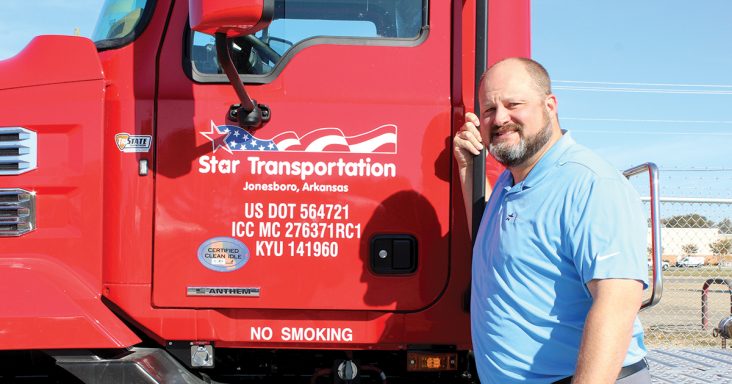Adjusting to pandemic fuels Star Transportation’s agility
by December 14, 2020 5:47 pm 1,704 views

Star Transportation's Al Heringer IV.
There is no road map for negotiating the rough and uncharted terrain that the COVID-19 pandemic has presented to many of those trying to make it through a difficult 2020. But one Jonesboro company, in existence for more than 80 years, has proven over the long haul that it is nimble enough to respond to changing economic conditions.
The firm founded by the Heringer family in 1926 under the name Lone Star Co., began as a petroleum marketing company. It was expanded to include a chain of service stations and convenience stores to adapt to the seasonality of the business. The family again expanded the business in 1994 into the petroleum common carrier business under the name of Star Transportation and no longer operates the retail stations and stores.
Today, Star Transportation consists of 105 trucks and more than 130 trailers with terminals in seven states and delivering petroleum products to more than 15 states, said Al Heringer IV, great-grandson of founder Al Heringer, and vice president of Star Transportation. The firm transports gasoline, diesel, aviation gas, jet fuel, ethanol and oil.
Heringer IV, said historically the company was recession-proof because even when fuel gets high, people buy it regardless of price. But the effects of the pandemic on the battered economy showed up in the petroleum common carrier business.
“I’ve never seen the economy as slow” as it became when the measures designed to slow the spread of the virus also throttled the economy, he said.
The company acquired a stainless steel trailer nearly a year ago in order to haul chicken fat from processors to plant manufacturers and biodiesel producers and may expand that line of business, he said. Additionally, Heringer noted, Star Transportation acquired some van-type trailers to accommodate the transport of other products.
During the height of the economic shutdown, Heringer said, the company’s business was off as much as 40% because motorists and truckers were using less fuel. Now, however, “we’re about to overcome” the slump.
“Even last year, it was tough,” he said.
While the economy continues to recover, he said, the rising COVID-19 numbers over the last few weeks have slowed down activity. And, with Americans’ focusing on the virus numbers and on the presidential election in November, “We’ve seen a little downtick in volume,” he said.
A number of retailers nationally canceled Black Friday in-store sales events in favor of online events, so that may have been a factor in recent reduced fuel demand, he noted.
“There’s not an economic forecast for any of this,” Heringer said. “I’m hoping by the first quarter of the new year to see improvement in the economy.”
However, Heringer cautioned it will still be tough until vaccines for the virus are available and Americans begin getting immunized.
At present, his biggest problem is finding qualified drivers for the company’s tractor-trailer rigs.
“It’s one thing to be a truck driver. It’s another to be a gas hauler,” Heringer said. “But when we put you in the truck, you will have significant experience.”
His drivers also pass certification as hazardous materials tanker operators and hold the Transportation Worker Identification Credential (TWIC) from the U.S. Transportation Security Administration allowing the driver access to ports and terminals.
Heringer, a past president and board member of the Arkansas Trucking Association, said it’s difficult to attract young people to the industry because “nobody wants to drive a truck. Everybody wants to sit behind a desk or computer.” In his company, Heringer noted, drivers don’t have to be away from home overnight as long-haul truckers often do.
“It’s a tough job but it’s a great occupation,” he said.
Regardless of what adaptations may come in the future, the transport of petroleum products remains the company’s core business, Heringer said, adding, “We sell tanker loads of fuel and we sell a few farm loads.”
The company offers inventory management services, same-day deliveries, FTP or email billing options and customized reporting services. The company must deliver fuel safely and on time, Heringer said, or customers will start looking for somebody else.
“We’re the FedEx of their fuel,” he said.
